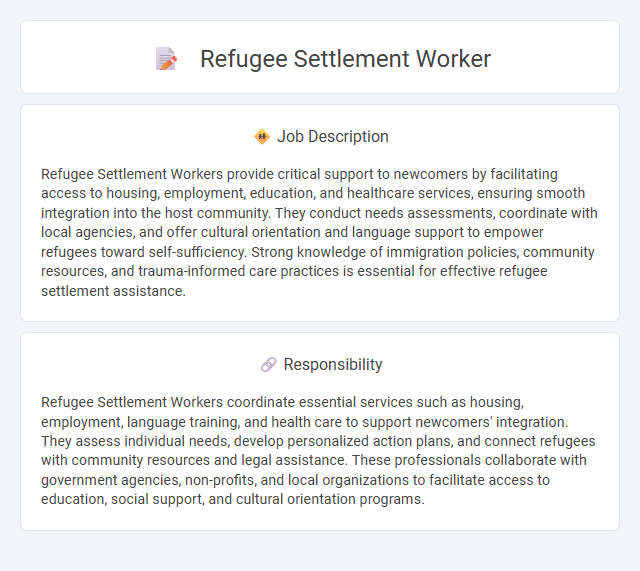
Refugee Settlement Workers provide critical support to newcomers by facilitating access to housing, employment, education, and healthcare services, ensuring smooth integration into the host community. They conduct needs assessments, coordinate with local agencies, and offer cultural orientation and language support to empower refugees toward self-sufficiency. Strong knowledge of immigration policies, community resources, and trauma-informed care practices is essential for effective refugee settlement assistance.
Refugee Settlement Workers are likely to find this role suitable if they possess strong empathy, cultural sensitivity, and resilience, as the job frequently involves supporting individuals who have experienced trauma and displacement. Those who can effectively navigate complex social systems and provide practical assistance to refugees in adapting to new environments may thrive in this position. Candidates lacking emotional stamina or interpersonal skills might face challenges in meeting the demanding needs of this role.
Qualification
A Refugee Settlement Worker typically requires a diploma or degree in social work, human services, or a related field, with specialized training in refugee resettlement and multicultural counseling. Proficiency in multiple languages and knowledge of immigration laws and community resources significantly enhance effectiveness in supporting refugee integration. Strong communication, case management skills, and experience working with diverse populations are essential qualifications.
Responsibility
Refugee Settlement Workers coordinate essential services such as housing, employment, language training, and health care to support newcomers' integration. They assess individual needs, develop personalized action plans, and connect refugees with community resources and legal assistance. These professionals collaborate with government agencies, non-profits, and local organizations to facilitate access to education, social support, and cultural orientation programs.
Benefit
Refugee Settlement Worker roles likely offer extensive opportunities for meaningful community impact by assisting newcomers in adapting to their new environment. These positions probably provide valuable experience in cultural competency and social services, which can enhance career prospects in human services. Workers in this field may also access supportive networks and professional development, increasing their ability to effectively navigate complex social systems.
Challenge
Refugee Settlement Worker roles likely involve significant challenges related to navigating complex legal and social systems to support newcomers effectively. The probability of encountering language barriers, cultural adjustments, and trauma-related issues among refugees appears high. Managing limited resources while addressing urgent needs may further complicate the settlement process.
Career Advancement
Refugee Settlement Workers gain valuable experience in cultural competency, case management, and community resource coordination, positioning them for advanced roles such as program coordinator or social services manager. This career path offers opportunities to develop specialized skills in immigration law, mental health support, and policy advocacy, enhancing prospects for leadership within nonprofit organizations and government agencies. Continuous professional development and networking are critical for advancement, enabling workers to influence refugee integration strategies and secure higher-level, impactful positions.
 kuljobs.com
kuljobs.com